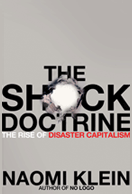The Shock Doctrine

Disaster Capitalism in Action: lending
Wall Street Repackages Toxic Debt (Again)
Matt Apuzzo, Associated Press, August 24, 2009
"Wall Street may have discovered a way out from under the bad debt and risky mortgages that have clogged the financial markets. The would-be solution probably sounds familiar: It's a lot like what got banks in trouble in the first place.
"In recent months investment banks have been repackaging old mortgage securities and offering to sell them as new products, a plan that's nearly identical to the complicated investment packages at the heart of the market's collapse....
"In recent months, banks have tiptoed toward a possible solution, one in which the really good bonds get bundled with some not-quite-so-good bonds. Banks sweeten the deal for investors and, voila, the newly repackaged bonds receive AAA ratings, a stamp of approval that means they're the safest investment you can buy. 'You've now taken what was an A-rated security and made it eligible for AAA treatment,' said Richard Reilly, a partner with White & Case in New York."
Big Banks Marketing Risky Lending Practices
Jessica Silver-Greenberg, Theo Francis and Ben Levisohn, Business Week, August 5, 2009
"In recent months such big banks as Bank of America (BAC), Citigroup (C), and JPMorgan Chase (JPM) have rolled out newfangled corporate credit lines tied to complicated and volatile derivatives. Others, including Wells Fargo (WFC) and Fifth Third (FITB), are offering payday-loan programs aimed at cash-strapped consumers. Still others are marketing new, potentially risky 'structured notes' to small investors....
"Some of Wall Street's latest innovations give reason for pause. Consider a trend in business loans. Lenders typically tie corporate credit lines to short-term interest rates. But now Citi, JPMorgan Chase, and BofA, among others, are linking credit lines both to short-term rates and credit default swaps (CDSs), the volatile and complicated derivatives that are supposed to act as "insurance" by paying off the owners if a company defaults on its debt. JPMorgan, BofA, and Citi declined to comment.
"In these new arrangements, when the price of the CDS rises—generally a sign the market thinks the company's health is deteriorating—the cost of the loan increases, too. The result: The weaker the company, the higher the interest rates it must pay, which hurts the company further.
"The lenders stress that the new products give them extra protection against default. But for companies, the opposite may be true. Managers now must deal with two layers of volatility—both short-term interest rates and credit default swaps, whose prices can spike for reasons outside their control."
Lending By Bailed Out Banks Continues to Fall
Martin Crutsinger, Associated Press, June 15, 2009
"The value of loans held by the 21 largest institutions getting support from the government's $700 billion bailout fund fell in April, the fifth decline in six months....
"The big banks included in Treasury's monthly loan survey account for more than half of the net loans outstanding at financial institutions."
Lending by Bailed Out Banks Keeps Dropping
, Wall Street Journal, April 20, 2009
Lending at the biggest U.S. banks has fallen more sharply than realized, despite government efforts to pump billions of dollars into the financial sector.
According to a Wall Street Journal analysis of Treasury Department data, the biggest recipients of taxpayer aid made or refinanced 23% less in new loans in February, the latest available data, than in October, the month the Treasury kicked off the Troubled Asset Relief Program. The total dollar amount of new loans declined in three of the four months the government has reported this data.
Largest Banks That Received Aid Cut Lending
Christopher S. Rugaber, Associated Press, February 17, 2009
"The 20 largest banks that received government rescue funds slightly reduced their lending to consumers and businesses in the last three months of 2008, the government said Tuesday.
"The Treasury Department said the banks reduced their mortgage and business loans by a median of 1 percent each, while credit card lending rose by a median of 2 percent. The median is the point halfway between the banks that lent the most and those that lent the least.
Banks Refuse to Publicly Disclose How Bailout Money is Being Spent
Matt Apuzzo, Associated Press, December 22, 2008
"'We've lent some of it. We've not lent some of it. We've not given any accounting of, "Here's how we're doing it," said Thomas Kelly, a spokesman for JPMorgan Chase, which received $25 billion in emergency bailout money. 'We have not disclosed that to the public. We're declining to.'
"The Associated Press contacted 21 banks that received at least $1 billion in government money and asked four questions: How much has been spent? What was it spent on? How much is being held in savings, and what's the plan for the rest? None of the banks provided specific answers....
"No bank provided even the most basic accounting for the federal money. 'We're choosing not to disclose that,' said Kevin Heine, spokesman for Bank of New York Mellon, which received about $3 billion....Heine, the New York Mellon Corp. spokesman who said he wouldn't share spending specifics, added: 'I just would prefer if you wouldn't say that we're not going to discuss those details.'"
What Crisis? Banking Lending is on the Rise, Say Experts
Mike Meyers, Minneapolis Star-Tribune, November 2, 2008
"The nation indeed may be facing a financial crisis, with large institutions failing in the wake of multibillion debts, but most bank-lending to business customers actually has been on the rise....
"'The story goes that they [banks] are holding on to the money or putting it into Treasury bills,' said Lawrence Christiano, a Northwestern University economist and consultant to the Federal Reserve Bank of Minneapolis. 'That seems to fly directly into the face of the evidence that's out there.'
"It's a puzzle that's getting little attention, even as hundreds of billions of taxpayer dollars are devoted to fixing a problem that seems belied by government figures. 'Their own data seems to contradict their position,' said V.V. Chari. 'It would be valuable for them to explain what they're talking about.'
"The $700 billion taxpayer bailout of large players in the financial system reminds Chari of the buildup to the Iraq war. 'The analogies with the war in Iraq are more than disturbing,' Chari said. 'We're again hearing things like: "We know things you don't know. Trust us."














